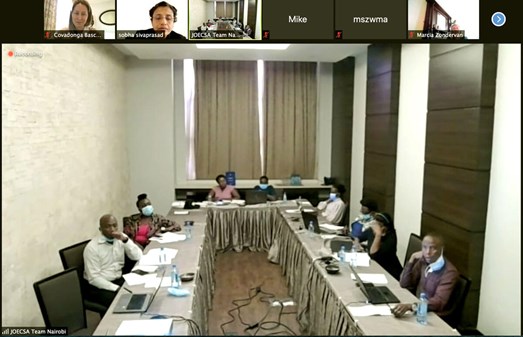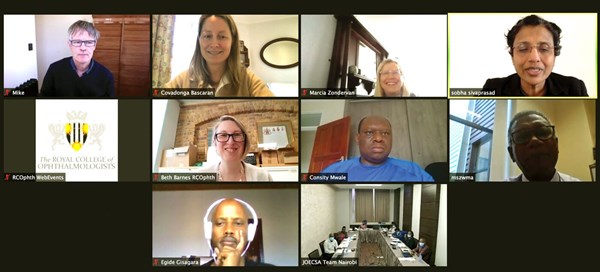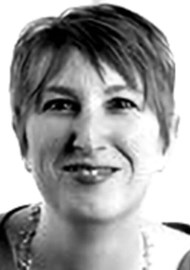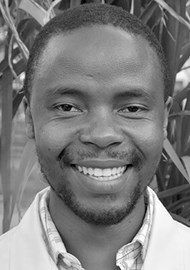The College of Ophthalmology of Central, Eastern and Southern Africa (COECSA) [1] and the Royal College of Ophthalmologists (RCOphth) [2] have a long-standing health partnership through the VISION 2020 LINKS Programme [3,4].
The LINK started a new project in 2019 funded by British Council for Prevention of Blindness (BCPB) [5] and the RCOphth. Through this project the scientific journals of each of the colleges, JOECSA [6] and Eye [7], are working together with the aim of developing and enhancing JOECSA as a scientific journal in ophthalmology.
In March 2019 the first meeting between the JOECSA and Eye editorial boards took place in London. It was decided that it was a priority for JOECSA to improve the capacity and knowledge of the editorial board and Eye committed to help with training and mentoring. The two key areas for development identified by JOECSA at this time were:
1. Weak editorial board with most members not familiar with their roles
2. A manual submission and review process conducted by email.
In August 2019 JOECSA established a new editorial board during the COECSA Annual Congress in Kigali, Rwanda. This was followed by an application for funding and the award of a grant by BCPB to the VISION 2020 LINKS Programme. The RCOphth provided additional funding for the project.
Adapting to COVID-19
The originally planned project activities had to be adapted due to the restrictions created by the pandemic. Over the last 18 months the JOECSA, Eye, RCOphth and International Centre for Eye Health (ICEH) teams have conducted regular meetings via Zoom, working towards JOECSA’s priorities for development:
1. To build editorial capacity by training and mentorship
2. To streamline the submission and review processes using an automated online system
In addition, secondary mid-term objectives for JOECSA are:
3. To expand the JOECSA reviewer base
4. To make JOECSA available on indexed platforms.

Participants at the JOECSA-Eye workshop held in Nairobi, March 2021.
First Editorial Training Workshop
The first JOECSA-Eye Editorial Training Workshop took place on 12 March 2021 co-chaired by Professor Sobha Sivaprasad, Editor of Eye, Dr Simon Arunga, Editor-in-Chief of JOECSA, and Dr Nyenze Muindi, Assistant Editor of JOECSA. Due to the pandemic the workshop was delivered in a hybrid mode, with participants who could travel congregating face-to-face in Nairobi, and the rest joining in virtually via Zoom from Zambia, Rwanda and the UK.
Prof Sivaprasad outlined the aim of the workshop, which was to help enhance and build up JOECSA’s editorial board processes.
Dr Arunga gave an update of JOECSA’s progress since the project began. Key milestones were:
- establishment of a new board with engaged and trained editors
- commission and implementation of a fully online editorial system for submission of papers and reviewing for JOECSA
- the training of the associate editors to use the programme
- employment of an administrator to manage JOECSA’s editorial processes.
The COECSA IT support manager provided a live demonstration of the system for all workshop participants, describing the process step-by-step from point of submission to acceptance and publication.
The workshop included a practical demonstration from Prof Sivaprasad on how to read and make a decision on an abstract submitted for publication. This was followed by a session on how to get published.

Zoom participants at the JOECSA-Eye Workshop held in Nairobi, March 2021.
Participants were then asked to read and review three research papers recently submitted to JOECSA and provide comments and decisions on the quality and recommendations to improve the papers for publication. This session was facilitated by Dr Mike Burdon, Dr Winfried Amoaku and Prof Sivaprasad. Finally, Dr Amoaku led a session with tips on how to find reviewers.
Second Editorial Training Workshop
The second JOECSA-Eye Editorial Training Workshop took place on 30 September 2021, again using a hybrid format, with some participants meeting in person in Nairobi and others joining from Africa and the UK by Zoom.
The board completed training on the newly-developed online journal management system. This system will greatly streamline the journal by improving JOECSA manuscript processes and turn-around time.
The board also undertook a training exercise in how to review journal articles, in parallel with reviewers from the LINKS Programme. The exercise involved assigning random articles to each board member to review using the JOECSA review template. In parallel, for each article a senior reviewer from the LINKS network also reviewed the article. The two reviewers then presented their reviews to the group.
“The second Editorial Board meeting was a huge success. The exercise where every member of the Board reviewed an article was fun, engaging and very informative. This is something we plan to do more often in future as a way of strengthening the review skills of our new board.”
Simon Arunga, Editor-in-Chief of JOECSA
The JOECSA Editorial Board perspective
From our perspective, we have found the project as a whole very useful in supporting the growth of our journal. Since we started this collaboration in 2019, building on a strong COECSA-RCOphth LINK, it has been a journey of continued support and growth. This project has contributed to our journal not only with the expertise, resources and knowledge, but also an awareness of knowing that you have friends who are rooting for you and want you to do well. This created a sense of responsibility in our team to make sure we did not disappoint.
Receiving support from BCPB and RCOphth helped to ensure that funding was available to support exchange visits for the chief and deputy editor as observers in Eye editorial board meetings and to conduct a series of training workshops for the editorial board. However, the COVID-19 pandemic travel and meeting restrictions hampered the exchange visits.
Despite these challenges, there was real motivation and drive on both sides to make this work. We planned regular monthly zoom meetings between JOECSA and Eye to discuss growth plans and challenges for JOECSA and learn from the experiences of the Eye team. We accessed resources and materials including online training sessions. This worked reasonably well but there were still the usual challenges of internet connectivity and synchronising work schedules of all the board members.
At the end of the severe lockdown period in our region, we had an opportunity of conducting a hybrid meeting which included a physical meeting of the editorial board in Nairobi (for those who could travel) and online faculty from Eye and ICEH. We took this opportunity to conduct our first JOECSA board meeting with a newly constituted board. For the first time, most of the board members were able to receive training in how to use the online journal system to review / solicit for review and communicate to the reviewers. This was a critical step that would enable us to transition from a manual system of receiving and processing papers to an automated online system.
Before this training, most of the journal article processing work was being done by three out of the 10 board members. An additional five board members were trained on how to use the system. We believe this will improve the efficiency of our article processing times and ultimately make the journal more attractive to authors.
The RCOphth perspective
This work is a welcome addition to the portfolio of successful projects the RCOphth is collaborating on with international partners. The RCOphth believes in the benefits to patients, ophthalmologists and allied health professionals from the exchange of ideas and experience. We aim to empower ophthalmologists to achieve the lifelong learning and expertise needed for the future of ophthalmology. The College is involved in a variety of projects in education, training and examinations, setting standards for professional practice, promoting research and supporting sustainable improvements in ophthalmic healthcare.
Expertise in teaching and training is used to improve standards in ophthalmic care and make them sustainable. This is the basis of the VISION 2020 LINK between the RCOphth and COECSA, sharing knowledge and skills in the following:
- Training the Trainers
- Examinations development, e.g. organisation of examination papers, clinical assessments, and examiner training
- Continued Professional Development – sharing the principles of lifelong learning
- Curriculum and syllabus development to encourage best practice in training and assessment methods
- Microsurgical skills courses
- Leadership courses
- Sharing guidelines and development methods.
In addition to our COECSA LINK, we support refugee ophthalmologists new to the UK. Information about this and other international activities can be found on our website [8,9]. An International Symposium is a regular feature at our annual Congress. This helps to raise awareness of the LINKS Programme [10] and other professional interactions between UK eye health professionals and their counterparts in low- and middle-income countries to raise the standards of eye healthcare globally.
Summary
The JOECSA-Eye project, part of the long-standing VISION 2020 LINK between the RCOphth and COECSA, has provided timely training and mentorship for the new editorial board of JOECSA. The board of JOECSA has successfully implemented the new online system for submission and review of papers and continues to work towards increasing the submission rates for the journal.
References
1. College of Ophthalmology of Central, Eastern and Southern Africa:
https://coecsa.org/
2. Royal College of Ophthalmologists:
https://www.rcophth.ac.uk/
3. Costello D, Gachago M, Onyango J, et al. VISION 2020 LINKS: COECSA Fellowship examination goes from strength to strength. Eye News 2019;25(6):20-5.
4. Astbury N, Mabey D, Onyango J, Zondervan M. Building leaders for eye care in Africa: the COECSA-RCOphth VISION 2020 LINK. Eye News 2015;21(6):36-40.
5. British Council for Prevention of Blindness (now closed):
https://bcpb.org/
6. The Journal of Ophthalmology of Eastern, Central and Southern Africa:
https://joecsa.coecsa.org/index.php
?journal=joecsa
7. Eye: https://www.nature.com/eye/
8. Royal College of Ophthalmologists. Refugee Ophthalmologists:
https://www.rcophth.ac.uk/training/
working-in-britain-for-non-uk-doctors/
refugee-ophthalmologists/
9. Royal College of Ophthalmologists. Working in Britain for non-UK doctors:
https://www.rcophth.ac.uk/training/
working-in-britain-for-non-uk-doctors/
10. International Centre for Eye Health. VISION 2020 LINKS Programme:
https://iceh.lshtm.ac.uk/links/
(All links last accessed October 2021)
COMMENTS ARE WELCOME









